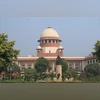The Supreme Court has ruled that any incriminating statements made by an accused in custody under the Prevention of Money Laundering Act are not admissible as evidence.
In a judgement delivered today, the Supreme Court reiterated that even under the Prevention of Money Laundering Act (PMLA), bail should be the norm, with jail as the exception.
A Bench comprising Justices BR Gavai and KV Viswanathan reaffirmed the Supreme Court’s position on the matter while granting bail to a defendant in a money laundering case. The court clarified that while Section 45 of the PMLA imposes twin conditions for bail, it does not override the basic principle that bail is the standard practice.
“Liberty of an individual is always the rule and deprivation is the exception. S.45 PMLA, by imposing twin conditions, does not rewrite this principle to mean that deprivation is the norm and liberty is the exception,” the Supreme Court stated.
The Bench granted bail after considering the defendant’s lengthy detention and the slow progress of the trial, which involved numerous witnesses. It overturned the Jharkhand High Court’s decision that had previously denied bail.
Also Read
The court also ruled that the prosecution must first establish foundational facts before applying the reverse burden of proof, as outlined in Section 24 of the PMLA.
Past judgement echoes importance of bail
Earlier in August, the Supreme Court reiterated its stance that ‘bail is the rule, and jail is the exception’ in special laws such as the Unlawful Activities (Prevention) Act of 1967. The court emphasised that bail should be granted if the legal conditions set by the special statute are fulfilled.
A bench comprising Justice Abhay Oka and Justice Augustine George Masih granted bail to a man accused of leasing his property to alleged members of the banned organisation Popular Front of India (PFI), purportedly for holding PFI training sessions.
SC questions fairness of the investigation
In recent times, the SC has been laying special emphasis on the need of central agencies to conduct a fair investigation so the rights of individuals can be protected. In another development earlier this week, the Supreme Court criticised the Central Bureau of Investigation (CBI) and the Enforcement Directorate in the Delhi Excise Policy case, raising concerns about the fairness of the investigations. After granting bail to BRS leader K Kavitha, who had been in custody since mid-March, the court remarked on the questionable approach of making a self-incriminating individual a witness, stating that “the prosecution must be fair”.
The court expressed disappointment with the case, noting that it was ‘Sorry’ to see the current state of affairs.
The bench questioned the credibility of the witness selection, stating, “How can you randomly select someone? What kind of fairness is this?”

)